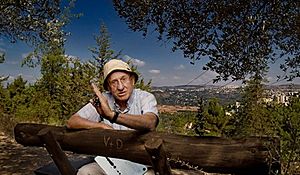Aharon Razin facts for kids
Quick facts for kids
Aharon Razin
|
|
|---|---|

Razin in 2009
|
|
| Born | April 6, 1935 |
| Died | May 27, 2019 (aged 85) |
| Nationality | Israeli |
| Alma mater | Hebrew University of Jerusalem |
| Awards | Gairdner Foundation International Award (2011) Wolf Prize in Medicine (2008) Israel Prize (2004) |
| Scientific career | |
| Fields | Biochemistry, molecular biology |
| Institutions | Hebrew University of Jerusalem |
Aharon Razin (Hebrew: אהרון רזין; April 6, 1935 – May 27, 2019) was an Israeli biochemist. He was a very important scientist who studied how our bodies work at a tiny, molecular level. His work helped us understand more about DNA, which is like the instruction manual for all living things.
Contents
A Life in Science: Aharon Razin
Aharon Razin grew up in a place called Petah Tikva. He started his studies at the Hebrew University of Jerusalem. There, he first focused on physics and mathematics.
Becoming a Biochemist
After his first studies, Razin decided to specialize in biochemistry. This field looks at the chemistry of living things. He earned his master's degree and then his PhD in biochemistry. To learn even more, he went to the California Institute of Technology for advanced research.
In 1971, Razin came back to Israel. He joined the Hebrew University Faculty of Medicine. He quickly became a senior lecturer, then an associate professor, and finally a full professor. He taught about how cells work and about human genetics.
Leading Research and Departments
In 1980, Razin became the head of the Department of Cellular Biochemistry. He also led the Institute of Biochemistry at the Faculty of Medicine. From 1988, he held a special position called the Dr. Jacob Greenbaum Chair of Medical Sciences.
Razin was also involved in many important committees. He helped guide research and development at the Hebrew University. He was also part of a national committee that advised on the Human Genome Project. This project aimed to map all the genes in humans. Later in his career, he became a professor emeritus. This means he was a retired professor who still had a special connection to the university.
Razin's Discoveries: Understanding DNA
Aharon Razin's research focused on how our bodies work at a very small level. Early in his career, he studied how important molecules called nucleic acids are used in the body. He also looked into problems in the body that cause diseases like gout.
The Secret of DNA Methylation
Later, Razin became famous for his work on something called DNA methylation. Imagine your DNA as a long book of instructions. DNA methylation is like tiny chemical "sticky notes" that can be added to certain parts of these instructions. These sticky notes don't change the words in the book, but they can tell your body whether to read a certain instruction or not.
Razin's research showed how these "sticky notes" can turn genes "on" or "off." This is super important because it controls how a cell develops and what it does. For example, it helps explain how a single cell can grow into a complex human body with different parts like brains, hearts, and bones. His work helped us understand how these patterns of methylation are made, especially as a baby develops in the womb.
Awards and Special Recognition
Aharon Razin received many important awards for his amazing scientific discoveries.
- In 2004, he was given the Israel Prize for biochemistry. This is one of the highest honors in Israel.
- In 2008, he won the Wolf Prize in Medicine. He shared this award with another scientist, Howard Cedar. They were recognized for helping us understand how DNA methylation controls which genes are active. Razin's work showed how these chemical changes on DNA turn the body's many genes on and off.
- In 2009, Razin also received The EMET Prize for Art, Science and Culture.
- In 2011, he was awarded the Canada Gairdner Award. He shared this with Howard Cedar and Adrian Peter Bird. They were honored for their "pioneering discoveries" about DNA methylation and its role in gene expression.
- In 2016, he received the Louisa Gross Horwitz Prize along with Howard Cedar and Gary Felsenfeld.
See also
- List of Israel Prize recipients
- Science and technology in Israel

